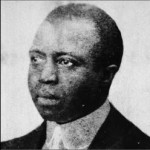 When music publisher John Stark first heard Scott Joplin play his piano, he knew that ragtime was the music of hope for a new America. But Joplin would never be content with popularity and fame. Joplin committed himself to racial justice in the early 1900s. He was inspired by Booker T. Washington and the Dahomeyan defeat in West Africa. But due to this earnest pursuit, he was ignored by the masses for writing the music of Civil Rights fifty years before America was ready to listen.
When music publisher John Stark first heard Scott Joplin play his piano, he knew that ragtime was the music of hope for a new America. But Joplin would never be content with popularity and fame. Joplin committed himself to racial justice in the early 1900s. He was inspired by Booker T. Washington and the Dahomeyan defeat in West Africa. But due to this earnest pursuit, he was ignored by the masses for writing the music of Civil Rights fifty years before America was ready to listen.
King of Rags, by Professor Eric Bronson, is a historical fiction account of the quest for racial equality at the turn of the 20th Century. Dr. Bronson takes a fresh and invigorating look at the tragic life of Scott Joplin and his fellow ragtime musicians as they frantically transformed the seedy and segregated underbelly of comedians, conmen and prostitutes who called Americas most vibrant cities home.
His story brings to light numerous interesting and little known historical discoveries about life in America including:
1. One hundred years before hip-hop star Ludacris was called a “corrupter” of morals, before Elvis was attacked for playing the devil’s music, ragtime musicians like Scott Joplin were criticized in the media for spoiling the innocent sensibilities of teenage boys and girls.
2. The father of the blues, W.C. Handy was influenced by ragtime musicians in St. Louis.
3. One hundred years before Barack Obama became America’s first African-American president, Joplin wrote an opera about Booker T. Washington’s invitation to the White House, entitled “A Guest of Honor.”
4. “Treemonisha,” Joplin’s race opera about a young black woman who lifts her village out of ignorance, was ignored in his lifetime and for many years after his death.
5. Joplin, the king of all ragtime composers, was buried in an unmarked grave in New York. He was awarded a Pulitzer Prize posthumously, only after his music was featured in the popular film, “The Sting.”
6. Comedians have always been on the cutting edge of the racial divide. Nearly one hundred years ago, Booker T. Washington wrote that vaudeville star Bert Williams “has done more for our race than I have.”
7. During his stay in America, classical composer Anton Dvorák was widely criticized for insisting that, “the future music of this country must be founded upon what are called negro melodies. This must be the real foundation of any serious and original school of composition to be developed in the United States.”
8. Fifty years before Malcolm X popularized, “By any means necessary,” civil rights activist Ida Wells encouraged colored men to carry Winchester rifles in their resistance to lynching.
9. Besides being one of the best-known anti-slavery advocates of his day, and key confidant to President Lincoln, Frederick Douglass was also a passionate defender of rights for women. In 1848 he was one of the key speakers at Seneca Falls, America’s most important convention on women’s rights.
10. At the 1893 World’s Columbian Exposition in Chicago, Africans were allowed to exhibit, but African-Americans were barred. Among the exhibits was a 22,000-pound cheddar cheese from Perth, Ontario and an 18 by 24 foot map of the United States made entirely of pickles from Pennsylvania.
11. Long before Ray Charles was even born, another blind piano player was barnstorming the country. The great Blind Boone used to fill the house wherever he went…except for the time he emptied one. Legend has it that his rendition of “The Marshfield Tornado” was so realistic the audience ran out to look for shelter.
12. Jackie Robinson was not the first African-American baseball player to play in the Major Leagues. That distinction belongs to Moses Fleetwood Walker who played for the Toledo Blue Stockings in 1884, five years before baseball barred African-Americans from taking the field.
King of Rags resurrects America’s forgotten sons and daughters: piano players like Blind Boone who wore a gold watch with 33 diamonds though he couldn’t read the time, Civil Rights activists like Ida Wells who relentlessly challenged Chicago’s Columbian Exposition for shutting out African-Americans, and comedians like Bert Williams who helped move the issue of segregation from Broadway to Pennsylvania Avenue. Bronson’s meticulous research was conducted with the help of a start-up fund from York University in Toronto. He did archival research in Sedalia, St. Louis, Kansas City, Chicago, Nashville, Texarkana, and New York, cities that were pivotal to the ragtime scene. He was also given access to rare collections like Bert Williams’ handwritten joke book that is kept at the Schomburg Center for Research in Black Culture in New York, and the Booker T. Washington Papers at Fisk University in Nashville. The project began fortuitously in Texarkana, with a rare performance of Joplin’s “Treemonisha,” just blocks from where the ragtime king was born. King of Rags is a testament to the classical philosophical theme of one man reaching for something more than society wants to allow. It confronts the ways are we shaped by other people, and explores the powers of resistance inside us all.
For more information visit www.NeverlandPublishing.com
_________________________________________________________________________________